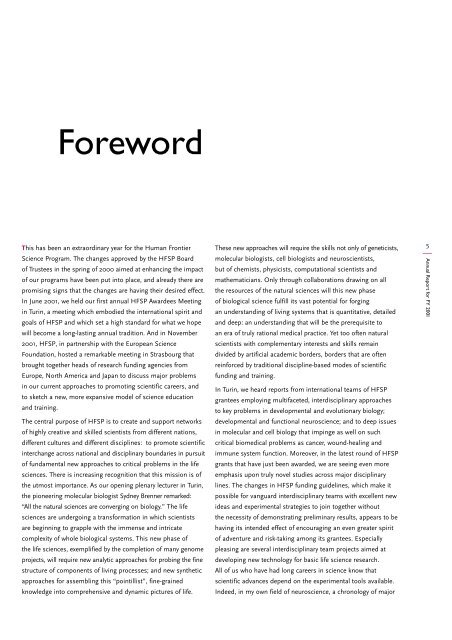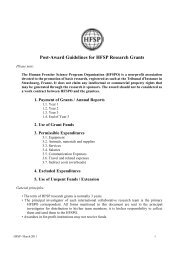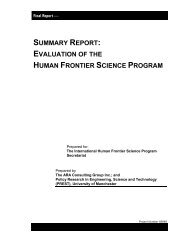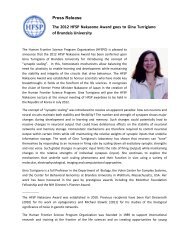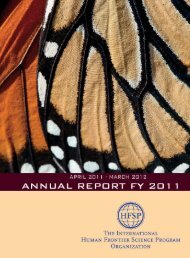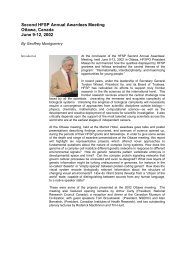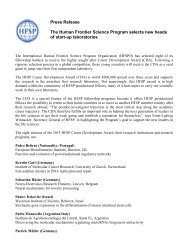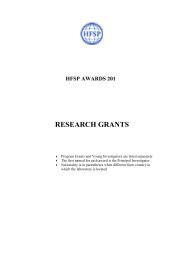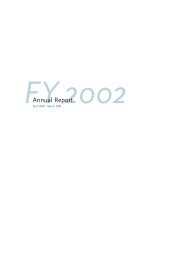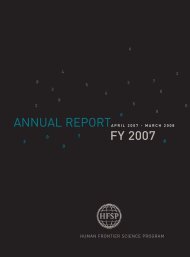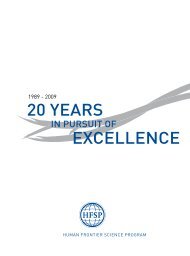Annual Report Fiscal Year 2001/2002 - Human Frontier Science ...
Annual Report Fiscal Year 2001/2002 - Human Frontier Science ...
Annual Report Fiscal Year 2001/2002 - Human Frontier Science ...
You also want an ePaper? Increase the reach of your titles
YUMPU automatically turns print PDFs into web optimized ePapers that Google loves.
Foreword<br />
This has been an extraordinary year for the <strong>Human</strong> <strong>Frontier</strong><br />
<strong>Science</strong> Program. The changes approved by the HFSP Board<br />
of Trustees in the spring of 2000 aimed at enhancing the impact<br />
of our programs have been put into place, and already there are<br />
promising signs that the changes are having their desired effect.<br />
In June <strong>2001</strong>, we held our first annual HFSP Awardees Meeting<br />
in Turin, a meeting which embodied the international spirit and<br />
goals of HFSP and which set a high standard for what we hope<br />
will become a long-lasting annual tradition. And in November<br />
<strong>2001</strong>, HFSP, in partnership with the European <strong>Science</strong><br />
Foundation, hosted a remarkable meeting in Strasbourg that<br />
brought together heads of research funding agencies from<br />
Europe, North America and Japan to discuss major problems<br />
in our current approaches to promoting scientific careers, and<br />
to sketch a new, more expansive model of science education<br />
and training.<br />
The central purpose of HFSP is to create and support networks<br />
of highly creative and skilled scientists from different nations,<br />
different cultures and different disciplines: to promote scientific<br />
interchange across national and disciplinary boundaries in pursuit<br />
of fundamental new approaches to critical problems in the life<br />
sciences. There is increasing recognition that this mission is of<br />
the utmost importance. As our opening plenary lecturer in Turin,<br />
the pioneering molecular biologist Sydney Brenner remarked:<br />
“All the natural sciences are converging on biology.” The life<br />
sciences are undergoing a transformation in which scientists<br />
are beginning to grapple with the immense and intricate<br />
complexity of whole biological systems. This new phase of<br />
the life sciences, exemplified by the completion of many genome<br />
projects, will require new analytic approaches for probing the fine<br />
structure of components of living processes; and new synthetic<br />
approaches for assembling this “pointillist”, fine-grained<br />
knowledge into comprehensive and dynamic pictures of life.<br />
These new approaches will require the skills not only of geneticists,<br />
molecular biologists, cell biologists and neuroscientists,<br />
but of chemists, physicists, computational scientists and<br />
mathematicians. Only through collaborations drawing on all<br />
the resources of the natural sciences will this new phase<br />
of biological science fulfill its vast potential for forging<br />
an understanding of living systems that is quantitative, detailed<br />
and deep: an understanding that will be the prerequisite to<br />
an era of truly rational medical practice. Yet too often natural<br />
scientists with complementary interests and skills remain<br />
divided by artificial academic borders, borders that are often<br />
reinforced by traditional discipline-based modes of scientific<br />
funding and training.<br />
In Turin, we heard reports from international teams of HFSP<br />
grantees employing multifaceted, interdisciplinary approaches<br />
to key problems in developmental and evolutionary biology;<br />
developmental and functional neuroscience; and to deep issues<br />
in molecular and cell biology that impinge as well on such<br />
critical biomedical problems as cancer, wound-healing and<br />
immune system function. Moreover, in the latest round of HFSP<br />
grants that have just been awarded, we are seeing even more<br />
emphasis upon truly novel studies across major disciplinary<br />
lines. The changes in HFSP funding guidelines, which make it<br />
possible for vanguard interdisciplinary teams with excellent new<br />
ideas and experimental strategies to join together without<br />
the necessity of demonstrating preliminary results, appears to be<br />
having its intended effect of encouraging an even greater spirit<br />
of adventure and risk-taking among its grantees. Especially<br />
pleasing are several interdisciplinary team projects aimed at<br />
developing new technology for basic life science research.<br />
All of us who have had long careers in science know that<br />
scientific advances depend on the experimental tools available.<br />
Indeed, in my own field of neuroscience, a chronology of major<br />
5<br />
—<br />
<strong>Annual</strong> <strong>Report</strong> for FY <strong>2001</strong>


